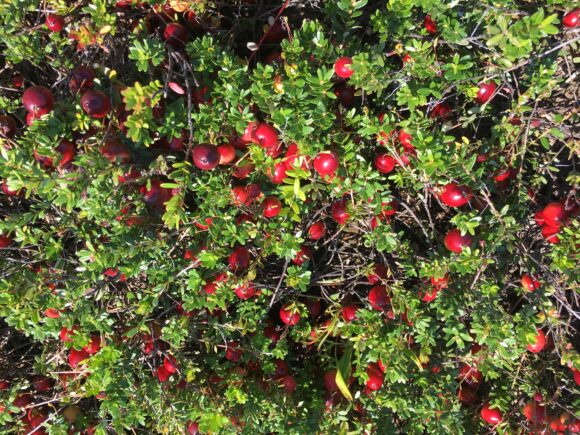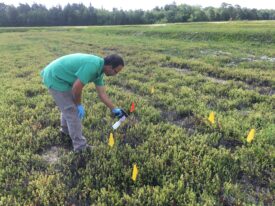
Cranberry plants. Photo: Joseph Heckman.
Nickel is one of the 18 chemical elements classified as essential for plant growth, development and reproduction. However, crops require nickel in only very small amounts. Until recently there has been very little research and extension focus on nickel soil fertility and plant nutrition.
In February 2022, Joseph Heckman, extension specialist in soil fertility, postdoc Alon Rabinovich, and James Polashock, USDA-ARS, were awarded a USDA-SARE grant to study the role of nickel nutrition in cranberry plant health and crop production. Most of their research on nickel nutrition is being carried out at the Rutgers Philip E. Marucci Center for Blueberry and Cranberry Research and Extension.
Nickel is known to play an important role in the function of several enzymes in plants. The mineral may also help to protect plant health. Some studies suggests that nickel may improve fruit quality and protect against blossom end rot.

Alon Rabinovich applying nickel fertilizer as a foliar spray to experimental plots of cranberry plants. Photo: Joseph Heckman.
Nickel is a component of the enzyme urease, which enables plants to convert urea into a form of usable nitrogen for plant mineral nutrition. Urea is the most widely used commercial source of nitrogen fertilizer by farmers. Thus, nickel, although only required in small amounts, has a very important role in plant mineral nutrition.

Alon Rabinovich is shown here sampling pecan leaves from a step ladder at The Rutgers Plant Science Research and Extension Farm in Adelphia. Photo: Joseph Heckman)
In addition to research on nickel nutrition of cranberry, the team is also surveying New Jersey soils and crops. They began by focusing on sampling tree crops (pecan, hazelnut, apple, and peach) because woody perennials are generally more susceptible to nickel deficiency. Much of the original field observations of nickel deficiency were with pecan orchards in the state of Georgia.
Because northern varieties of pecan are grown in New Jersey, the team set out in May 2022 to sample pecan trees growing in Hunterdon, Middlesex and Monmouth counties, where they collected pecan leaf tissue samples and soils from under the trees.
Read more on the NJAES nickel soil fertility research project in The Soil Profile newsletter.

